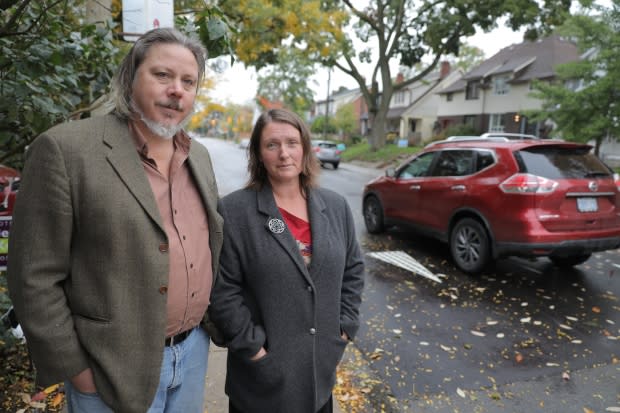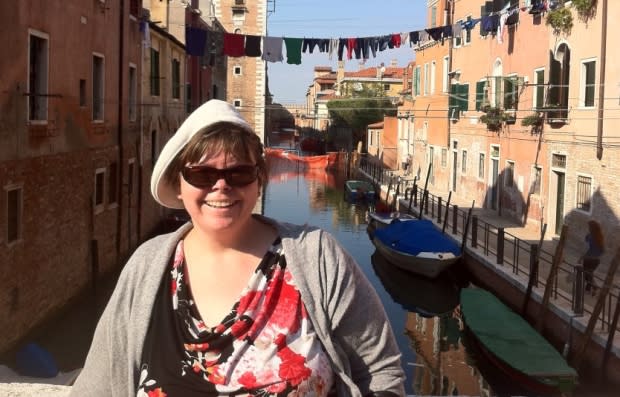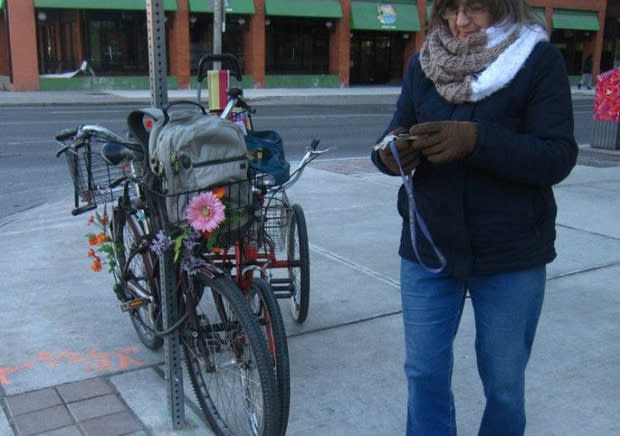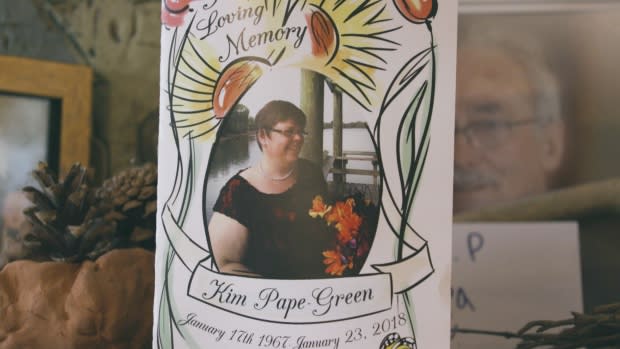How 3 members of a Toronto family were hit by different drivers all in the same year
On a brisk January morning, Katya Schmied got the message from her mother first.
Then she heard the story on the radio.
A woman had been hit and killed by a driver in Newmarket the night before, the announcer said. Schmied's sister-in-law, a hard-working mother of three, lived in the residential neighbourhood near the crash site, an intersection where six lanes of oncoming and turning traffic meet a quiet suburban street.
Schmied, in a haze, told her husband to check his messages.
Kendrew Pape, her partner of more than two decades, opened his Facebook account. And there it was. A note from the husband of his beloved older sister Kim Pape-Green, letting him know the unthinkable news: Kim had been hit by a car, and hadn't survived.
"It was a shock. It was terrible," Pape recalls, his voice trembling. "It was all the things you expect when somebody you love dearly is wrenched away from you like that."
And it was a traumatic experience — having a loved one hit by a driver — that the family would endure twice more this year.
In February, just weeks after Kim's death, a driver went through a stop sign and struck Schmied's mother while she was cycling in Toronto's St. Lawrence Market neighbourhood.
Then in September, one of the couple's four children was hit by a car while walking through a flashing crosswalk at an intersection in the Don Mills area of North York.
Both survived, though they were injured and shaken.
For Schmied and Pape, it was a terrifying trio of events at different times and corners of the GTA that brought Toronto's high road death and injury toll into their own home, forever changing how they view the city's streets — and what needs to be done to make them safer spaces.
'I still don't know who to blame'
On the night of Jan. 22, Kim Pape-Green wasn't planning on making the roughly two-hour trek from her job in downtown Toronto to her home in Newmarket. The 51-year-old didn't drive, so a lengthy trip on public transit was her only option, and she often stayed at her father's home in North York to avoid the tiring commute.
That's where she was when she learned her teenage son had suffered a second-degree glue burn while working on an art project. As mothers do, Pape-Green quickly hopped on another bus north to be by his side.
She never made it home.

After getting off a city bus around 10:30 p.m. that night, just minutes from her house, Pape-Green was surrounded by heavy fog. She began walking across the street, then a driver making a left turn hit her.
Was she invisible to the person behind the wheel? Did she see the car coming through the fog? Did anyone comfort her after she was struck?
Those questions still haunt Pape months later. Sitting in his living room at his home near Danforth Avenue, the tall, sturdy 48-year-old holds his wife's hand tightly as he recounts what he knows about that night — and what he doesn't.
There were no witnesses, and the driver refused to speak to police, Pape says. That's left the family wondering about the circumstances surrounding the crash, which led to Pape-Green's death in a hospital the following morning.
Her sudden passing left the whole family without their "touchstone," a woman known for planning holiday gatherings, who never let a lifelong hearing impairment stop her from working multiple jobs and becoming an advocate for people with disabilities.
At first, Pape wanted to blame the weather — the thick fog. Then he wanted to blame his sister. Why, on that night, did she have to go all the way home after work instead of staying put in North York?
"Then I wanted to blame the driver," he adds. "I still don't know who to blame … I'm not ready to let my anger fall on an individual, when, really, this is bigger than simply one driver."

'It was Kim all over again'
Far bigger, in fact, than any one driver, one street, or one moment.
Last year, there were 62 deadly road incidents in Toronto alone, not counting the surrounding municipalities. More than half of those killed were pedestrians. Another 115 incidents left pedestrians seriously injured, Toronto police data shows.
So far this year, more than 30 more pedestrians across the city have died, along with multiple people cycling, driving or riding in cars or on motorcycles.
The month after Pape-Green's death, Schmied got word that her own mother could've been another statistic.
Jana Stepanek, who's now 75, often uses an adult tricycle to get around. One day in February, as she cycled across an Esplanade intersection, a car went through a stop sign and hit her, leaving her pinned under her bike.
Stepanek didn't have any broken bones or major injuries, but her leg was badly bruised, Schmied recalls. As a diabetic, her mother was then faced with prospect of losing her limb, though she wound up fully recovering.
On one hand, it was a relief. But Schmied says there's also a "numbness" that comes from another family member being struck. "It's just so stunning," she says.

As the months passed, and life returned to a sense of normalcy, the couple never expected a third loved one would also wind up in a similar situation.
Then in September, the pair's third child, 17-year-old Xenya — who uses they and them pronouns — was also hit by a driver who simply didn't stop in time.
Xenya had been up in the Don Mills area of North York, visiting their boyfriend. The pair were at a crosswalk along The Donway, waiting for a safe moment to walk as the lights above started flashing. First one car went through, then another behind it began to slow. Xenya started to cross, thinking the driver would stop.
Instead, the car ran right into Xenya — slowly, thankfully, leaving them shaken but only slightly bruised.
The driver looked meek, gave a wave of apology, and drove away. "And that was that," Pape says.
Losing his mother was heartbreaking enough for Pape, but the thought of his child coming close to a similar fate was overwhelming. After hearing the news in the family's dining room, he broke down in tears. If the driver had been going faster, if they hadn't eventually hit the brakes; there were just too many "ifs."
"It was Kim all over again for me," Pape says.

Family now calling for reduced speed limits
After enduring three incidents in a year, Pape and Schmied now feel utter frustration, and a nagging sense that there are deep, systemic issues at play.
"It's not the same driver every time. It's not the same situation every time," Pape says. "It seems to me as though what's really to blame is how we're driving and the roads we're driving on — the infrastructure itself."
In both instances in which their family members survived, Schmied says the drivers were going fairly slowly. It's not clear what took place in Pape-Green's death, but Schmied says lowering speed limits is a "no-brainer."
It's a move the city has taken on various roadways during John Tory's first term as mayor, amid the city's ongoing push for Vision Zero, a campaign to eliminate all road deaths, which has, so far, made little progress in terms of a dramatic reduction in deaths.
It's also an idea Tory's main rival in this year's mayoral race, Jennifer Keesmaat, is pushing to expand, with a campaign promise to drop the speed limit on all residential roads to 30 km/hr if she's elected.
Standing in front of their east-end home on Monday, Pape and Schmied point out their street's new speed bumps — freshly painted that morning, and a decade in the making thanks to advocacy work from their community.
It's one small change the pair hopes prevents the kind of misfortune that befell their family three times in one year. But they're now calling for more: reduced speed limits across the board, more onus on drivers to follow the rules, and system-wide changes like redesigned intersections and an end to Toronto's allowance of right-turns on red lights.
Could those kinds of changes have saved Pape-Green's life, or stopped two other drivers from hitting Schmied's mother and the couple's second-youngest child?
The pair doesn't know for sure, but with lives at stake, they believe the status-quo isn't enough.
"Every single person who drives on the road makes mistakes," says Schmied. "And we need the infrastructure in place so those mistakes aren't fatal."


